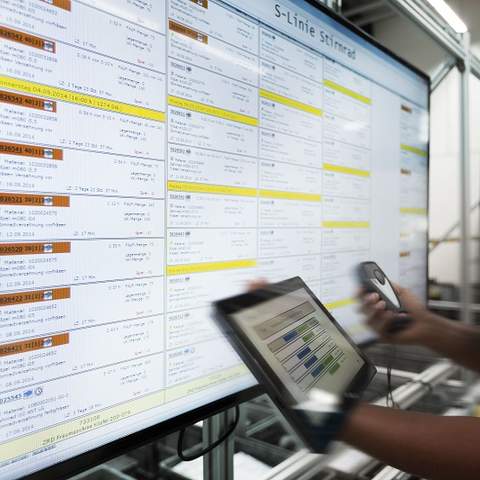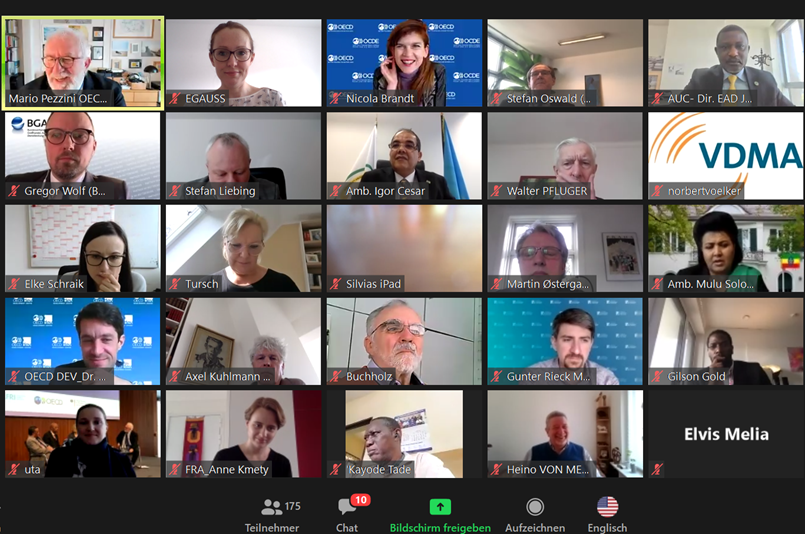"Africa's Development Dynamics 2021" - Digitalization for high-quality jobs
During a virtual event of the Sub-Saharan Africa Initiative of German Business (SAFRI), the African Union (AU) and the OECD Development Centre presented their report "Africa's Development Dynamics 2021". BDI is one of the sponsoring organizations of SAFRI. The key messages of the report are:
- The Corona pandemic poses an unprecedented financial challenge for Africa. Total national savings may decline by 18 percent, remittances from emigrant Africans to their countries of origin by 25 percent, and foreign direct investment by 40 percent. Household deficits are expected to double. International donors, on the other hand, have pledged to maintain development aid at pre-crisis levels.
- Africa's debt will rise to about 70 percent of gross domestic product (GDP). The G20 debt moratorium provides a necessary respite for African countries. A suspension and restructuring of debt may nevertheless be inevitable to finance Agenda 2063.
- The Corona crisis strengthens the role of digitalization in Africa's productive transformation. The continent can claim digital successes that are making headlines. The mobile money revolution is a well-known example. There are 480 million cell phone accounts in Africa. This is the highest number worldwide. Additionally, more than 500 African companies offer technology-enabled innovations in financial services. However, digital innovations must spread far beyond these islands of success into all sectors of the economy. Only when this happens will jobs be created on a large scale.
Digitalization as an enabler for high-quality jobs
According to the AU and OECD, African governments should initiate the following:
- Promoting digital innovation beyond major cities: Internet access has expanded with the proliferation of cell phones. 72 percent of Africans are now regularly online. However, digital usage remains unevenly distributed, for example, in terms of gender, income and location. Only 26 percent of the continent's rural population use the Internet regularly, compared with 47 percent of the urban population.
- Preparing Africa's workforce for digital transformation: Currently, almost one in two young people feel that their skills are not suitable for the local labor market.
- Remove barriers to innovation to make companies more competitive: Governments must support small and medium-sized enterprises to compete and innovate in the digital age. For example, owning a website is positively related to direct exports. With a website, the company can increase direct exports as a percentage of company sales by an average of 5.5 percent. However, only one in three companies in Africa's formal sector has its own website.
- Deepen regional and continental cooperation: Policies must be coordinated at the regional and continental levels. National digitalization strategies cannot work in hiding. Integrating digitalized economies into the African Continental Free Trade Area requires cross-border cooperation. This affects areas such as digital taxation, data security, data protection standards and cross-border data flows. So far, for example, only one in two African countries has any legislation on personal data protection.
Spectacular success stories raise hope
"Africa's digital economy is growing rapidly, helping to mitigate the impact of the Corona crisis. Many private and public players have adapted their digital practices in the face of pandemic constraints. The success stories are spectacular. For example, mobile money transfers in Rwanda increased fourfold during the first month of the lockdown, when contactless payments became the new normal," says Mario Pezzini, director of the OECD Development Centre and special adviser to the OECD secretary-general on development.
The BDI is getting involved
German business can make a positive contribution to driving digitalization forward on the African continent. One example: With its "Creating Perspectives" project with the East-African Business Council (EBAC), the BDI is networking German and East African companies and strengthening knowledge and technology transfer. Specifically, the BDI brought together the Kenyan company TenSense and the German company Phy2Trace to develop a digitalization solution for TenSence for the transparent and traceable management of its products and processes, including payment and certification. Thus, the BDI's work already builds on the findings of the report.





